Daughter of DAW: An Interview with Publisher Betsy Wollheim, Part I
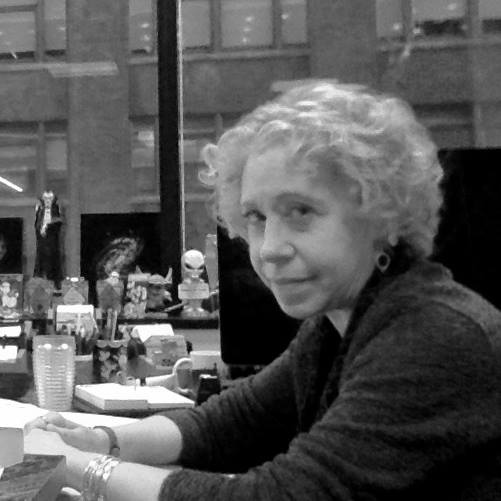
This interview was transcribed from a Zoom meeting of the Philadelphia Science Fiction Society on June 14, 2024, conducted by Darrell Schweitzer and hosted by Miriam Seidel.
Miriam Seidel: Betsy Wollheim has been a leading figure in SF and fantasy publishing for many decades, beginning as an editor at DAW Books in 1975, and taking over the company as president of DAW Books in 1985 from her father Donald A. Wollheim. She ran DAW with co-publisher Sheila E. Gilbert until Gilbert’s retirement recently. During her career she has worked with such noted authors as C.J. Cherryh, Tad Williams, Patrick Rothfuss, Nnedi Okorafor, Kristen Britain, Saladin Ahmed, David Gerrold, Tanith Lee, Marion Zimmer Bradley, Wole Talabi, among others.
In 2012 she became the first female long-form editor to win the Hugo Award during her lifetime. [In 1986, Judy-Lynn del Rey won, but posthumously, and the Hugo was refused by her husband, Lester del Rey. –DS] In 2018 Betsy was honored with the Lifetime Achievement Award from World Fantasy. In 2022 DAW was purchased by Thinkingdom Media Group of Beijing to be the SF/F publishing line of Astra Publishing House. Betsy continues to lead her list as publisher of DAW with her former employees and authors on behalf of Astra.
Darrell Schweitzer is a prolific SF/F/H author and critic. He is the author of four novels and numerous short stories, many published in translation, in the areas of dark fantasy and horror as well as science fiction and fantasy, some within the Cthulhu Mythos. He has written critical works on many writers within the field, including H.P. Lovecraft, Lord Dunsany, and Robert E. Howard. His editorial experience includes several decades on the staffs of Asimov’s, Amazing Stories, and Weird Tales. His work has been nominated for the World Fantasy Award and the Shirley Jackson Award and he won a World Fantasy Award in the professional category as co-editor of Weird Tales.
So please welcome Betsy Wollheim and Darrell Schweitzer.
[Applause.]
Darrell Schweitzer: In addition to that I lead the choir at the Cthulhu Prayer Breakfast at Necronomicon/Providence. This August you can see me do it again.
So, Betsy, I take it you are still editing DAW Books even though the company is owned by somebody else?
Betsy Wollheim: Yes, I am still the publisher of DAW Books even though I don’t own DAW Books, on behalf of Astra.
[Click the images for bigger versions.]
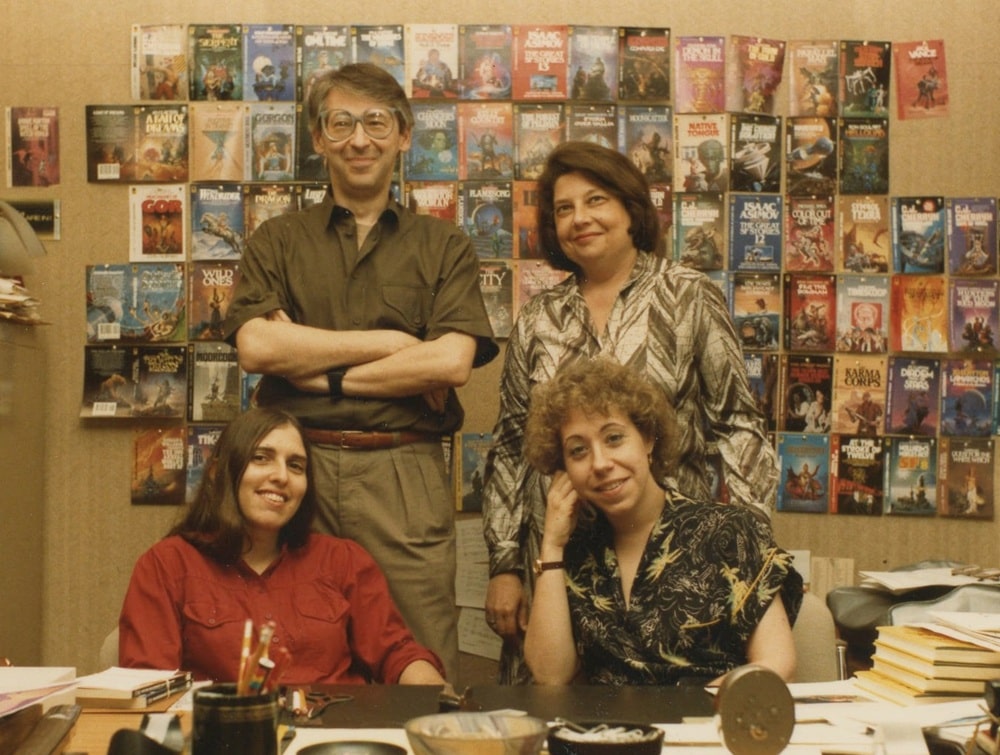
Does that mean it’s the same job, only it’s not your money?
Absolutely.
We hear so much about the trials and tribulations of the modern publisher. Are you getting flooded with AI submissions?
No. Not to my knowledge. Everything we see comes in from agents and I have yet to see an AI submission.
In the old days just anybody could mail a manuscript in to a publisher, “over the transom,” as the phrase put it. Is this no longer the case?
Actually I am publishing an author now who my husband found in the slush pile five years ago. I said I wanted to publish her. Despite having an offer of publication, she had a hard time finding an agent, so I offered to send her to the agent I deal with most often, and he really liked her work and took her on. Now I am publishing her. So it took years from discovery in the slush pile to actually being published.
So there still is a slush pile?
Not anymore. That was five years ago. When I was with DAW we believed in the slush pile. We read all the submissions, regardless of whether they had agents. This is, I believe, more valid now than it was then, because agents are so hard to get.
I have a feeling these days that a lot of writers are giving up and going straight to self-publication.
That’s a valid form. If they want to do that, that’s fine. We certainly have enough material. It’s not like publishers are being hurt.

The problem is that there are a lot of self-published books that are almost good and if they had been professionally edited they might actually be good. Also, anything can be self-published. There is no quality control at all, so it is an uphill fight to convince anybody that the book is any good. So one yearns for the old days of slush piles.
I just think it is short-sighted not to read the unagented slush. My husband found Tad Williams in the slush. My dad found C.J. Cherryh in the slush. It’s an amazing thing to do. Phenomenal.
I’ve only edited short fiction myself. I have never done book-length slush. I just imagine that you must have piles of boxed manuscripts up to the ceiling, and maybe a whole room full of them.
Oh, yeah.
And somehow you got through them all?
My husband was the first reader. He pulled out Tailchaser’s Song by Tad Williams because my father loves cats. He knew that. So he put it on my father’s desk, and he bought it. That was in 1984. That’s how Tad Williams got started.
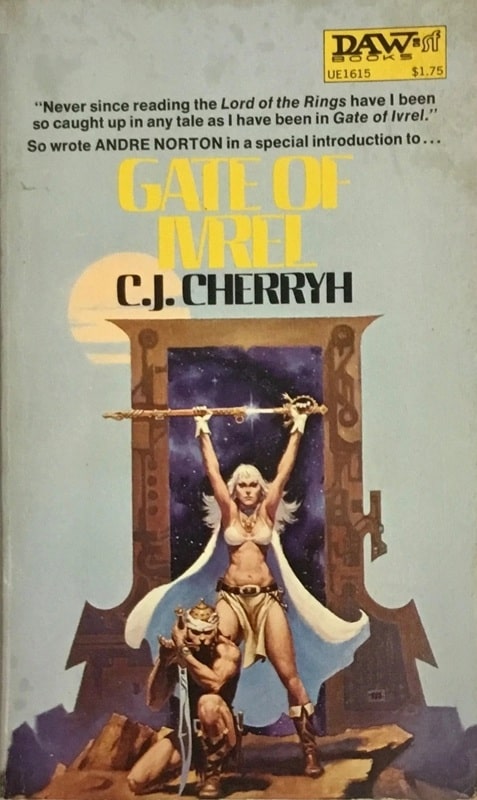 |
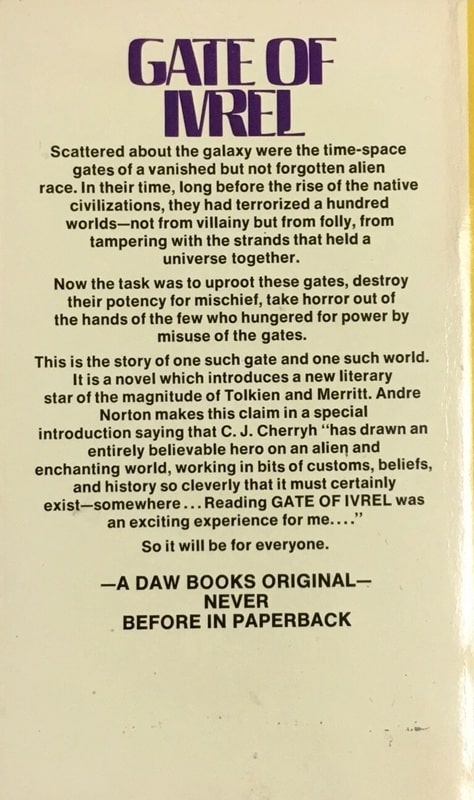 |
Gate of Ivrel by C.J. Cherryh (DAW Books, March 1976). Cover by Michael Whelan
All because of cats…
My father found C.J. Cherryh earlier than that, in 1975. He found Gate of Ivrel and Brothers of Earth in the slush, at the same time, two books. He wrote to her and said “I think we’re going to publish Gate of Ivrel first.” He never told her, “Guess what? We’re going to buy your books.” Just, “I think we’re going to publish Gate of Ivrel first.” That’s kind of a funny story, but that was my dad.
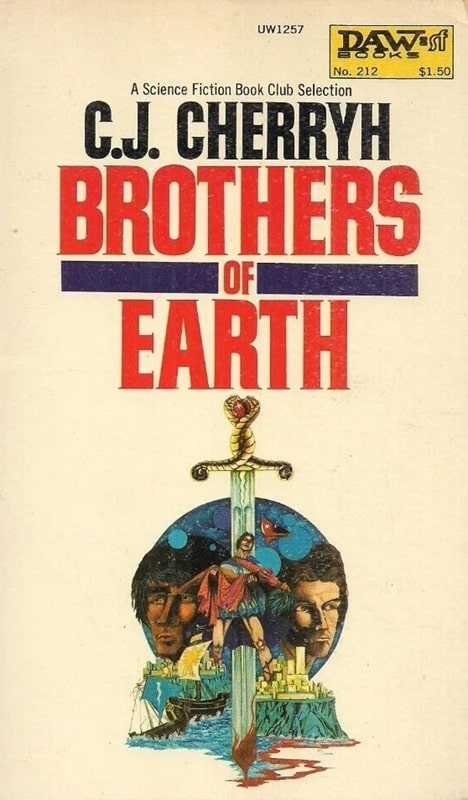 |
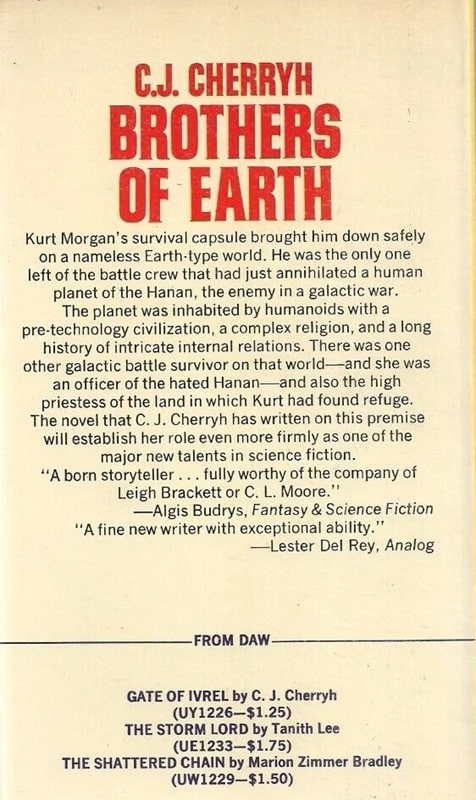 |
Brothers of Earth by C.J. Cherryh (DAW Books, October, 1976). Cover by Alan Atkinson
The story goes that there was then a consultation with Andre Norton over what her byline should be, because it was felt that Carolyn Cherry was possibly not appropriate.
My father didn’t have to ask Andre. He had been her publisher for years and he knew that her real name was Alice. Carolyn’s real name is Carolyn Janice Cherry. Like the fruit. My father felt it was a perfect romance writer’s name, but not suitable for hard science fiction, so he invented C.J. Cherryh by putting a silent “h” on the end of her name. The only person he discussed it with was Carolyn. It’s pronounced the same way, and it looks… I hate to say exotic because it’s not a word we use anymore… but it looked unusual, different. Special.
Another story I have always heard about DAW: Is it true that as soon as you took over, you and Sheila Gilbert killed the Gor books? Because they stank up the place.
I alone killed the Gor books. I am personally responsible for rejecting John Norman.
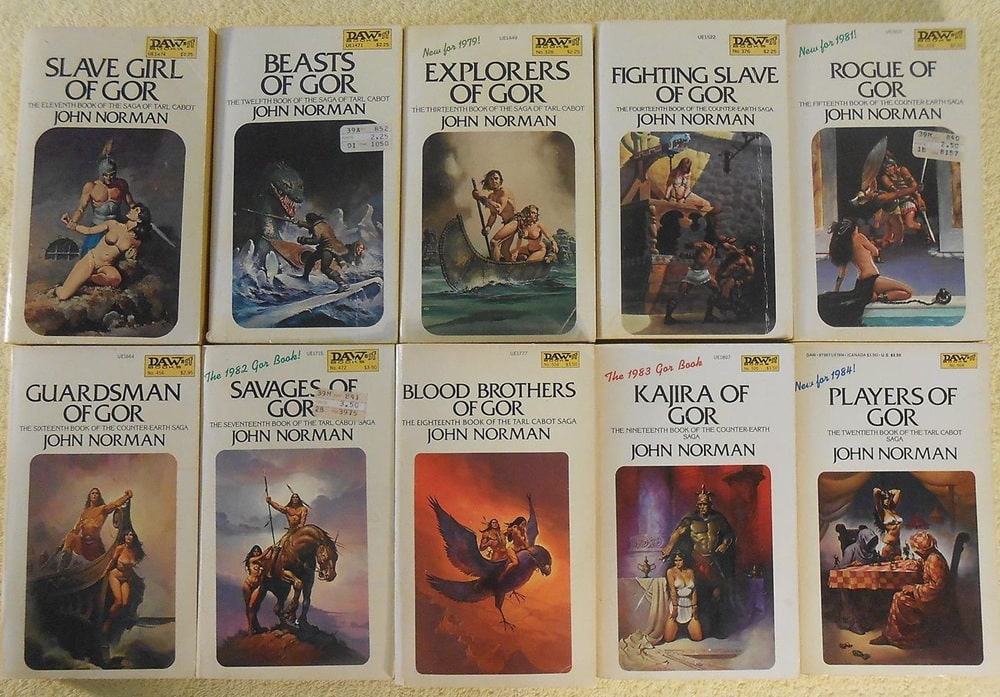
Despite the fact they made huge amounts of money.
I am very proud of that. We needed him in the beginning because he sold so well. And in the beginning he didn’t write quite as much about female slavery. He was more Burroughs-like. But he got worse and worse and worse and it got to the point where it was demeaning our company to publish them.
I can tell you a funny story. Most people didn’t review the Gor books, but L. Sprague de Camp reviewed the fourth one in Amra magazine and said, “This is a pretty good Burroughs imitation but the author has silly ideas about women.” Sprague was good at understatement.
The first seven were published by Betty Ballantine. DAW took over with the eighth.
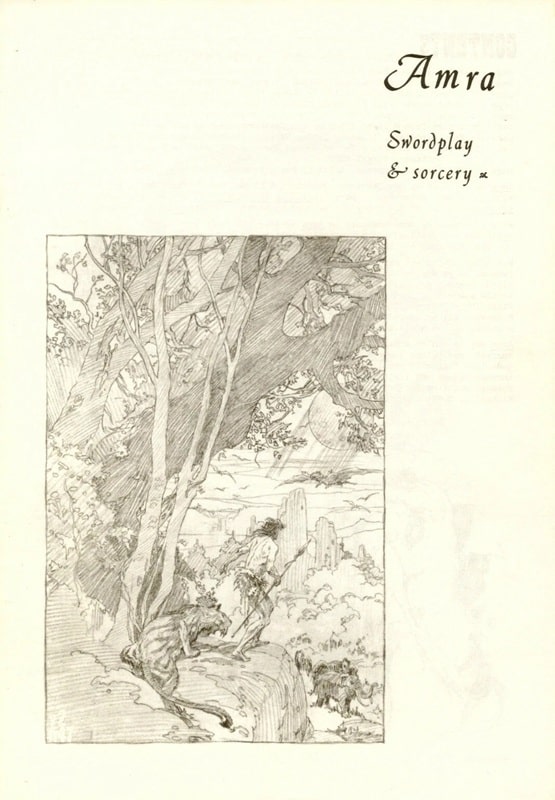
I know it wasn’t a DAW book but Sprague was the first person to notice that there was something odd here.
Yes, that would have been a Ballantine book.
I don’t imagine there are that many people you are proud of rejecting. You must be more proud of publishing people.
Yes, of course I’m more proud of publishing people! But when I rejected John Norman, he wrote a twenty-page letter to the head of Waldenbooks accusing me of censorship, which was pretty hilarious. The head of New American Library came up to me and said “Why aren’t you publishing him?” I said, “Hey, he’s yours. Go. Do it. You want to publish him, publish him.” If you accuse a publisher of censorship every time they reject a manuscript, then by that definition every manuscript submitted would have to be published. Books would be terrible. A publisher has to have some sort of editorial discretion.
I think the only time there was ever a publishing operation like that was when Saddam Hussein had a contest for books (or maybe it was poems) written in praise of himself, and publishers rapidly learned that they were not allowed to reject anything… But I don’t imagine that the results were masterpieces of literature.
No.
So have you found anybody exciting lately?
(At this point someone in the Zoom chat brings up Lin Carter’s Halloween parties in the 1960s, which we had been talking about before the interview began. I had heard about them at the time but was a little too young to be going up to New York by myself and so never attended. Betsy digresses, but this is interesting…)
Somebody pointed out that Lin Carter’s parties were a big fan draw, and a lot of professionals came up.
I heard that he had a big, gothic manor and a fabulous collection.
It was actually a large Arts and Crafts cottage in Queens. It was very beautiful and was filled with all sorts of wonderful things. Children’s sarcophagi, giant bar nudes over the dining room table, lamps from Damascus from 1900 and tiger-skull ash trays from 1850. He had amazing things in that house.
I remember him telling me once that he was saving up to buy a cuneiform tablet. It would have fit right in.
Yes.
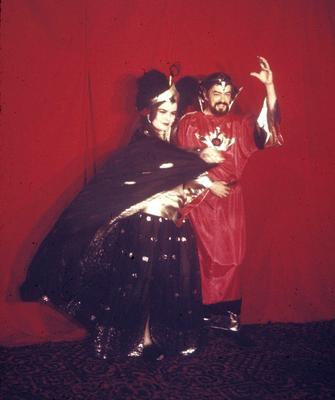
It is like the Ackermansion, one of those things that only exist in memory now.
[A fan from the audience: I have very happy memories of it.]
Me too. My parents were so close to Lin and his wife Noel that we went there at Halloween, New Year’s, and Easter every year. It was fun.
Alas, he lost it all. But we don’t need to go into that.
No, we don’t.
Another thing your father was famous for was essentially blasting Tolkien loose. There wouldn’t have been a Tolkien boom without him.
That’s true. He caused the boom of modern fantasy but got his name blackened as a result.
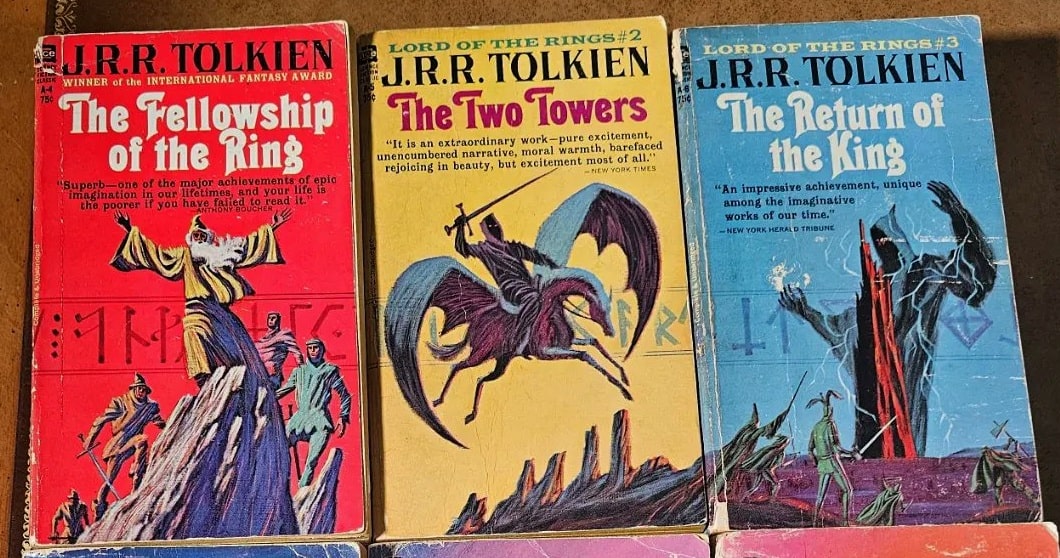
I have been told that he ended up paying Tolkien more money than Ballantine did.
Absolutely. 25% royalties on mass market copies sold. It says a lot on his Wikipedia page and I don’t want to go on about this whole Tolkien scandal that happened many decades ago.
I don’t see it as a scandal –
It was a scandal, believe me. It brought dark clouds over the dinner table for years and years. It is one of the reasons my father never won a Hugo. He really initiated the “Big Bang” that started the whole modern fantasy field by publishing those unauthorized editions, but Ballantine made the money and my dad was vilified. Before Tolkien, fantasy was mainly sword and sorcery.
We can also give him credit for helping to blast Edgar Rice Burroughs loose, when he was lapsing into the public domain and simultaneously going out of print.
He also first published Philip K. Dick and many people too numerous to name.
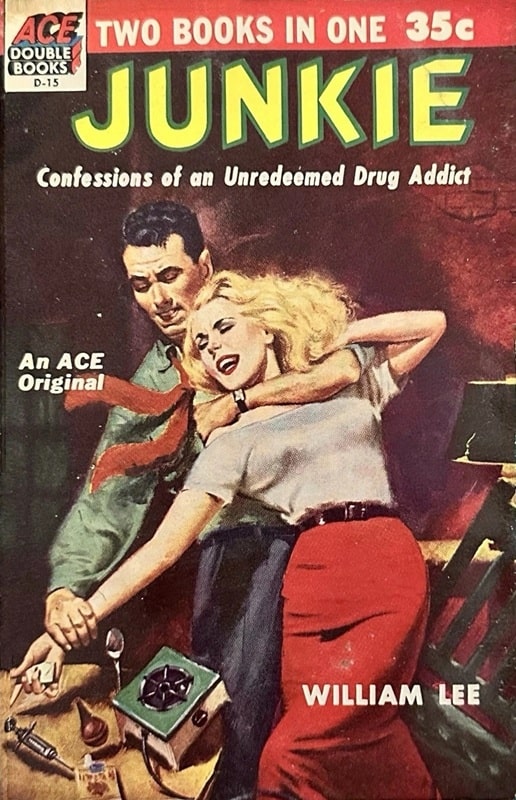 |
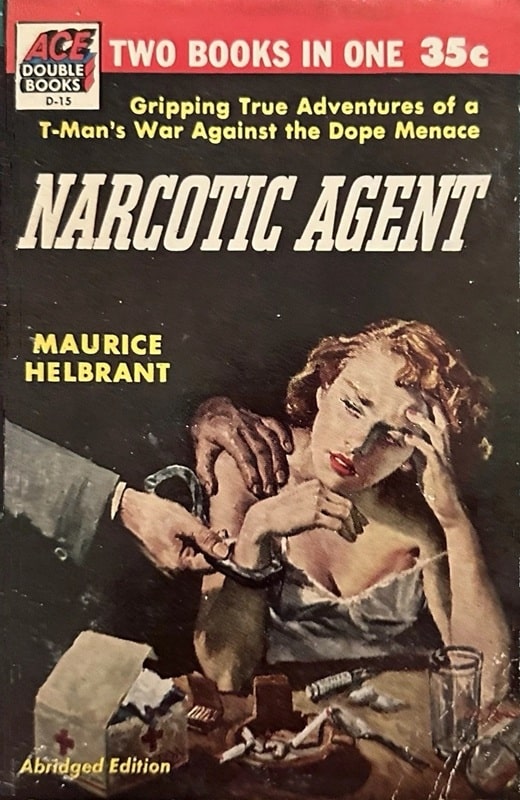 |
Ace Double D-15: Junkie by “William Lee” (William S. Burroughs), paired with
Narcotic Agent by Maurice Helbrant. Ace Books, 1953. Covers by Al Rossi
And William Burroughs.
And William Burroughs. I still have a first edition of Junkie by “William Lee” as an Ace Double, in the basement, backed with an anti-drug pamphlet. I have heard – I don’t know if I am remembering correctly – but my father said that Burroughs wanted to name the book Junk, and my father said “People will think it is a book about trash,” so he gave the name Junkie to that book. Because he said “everyone knows what a junkie is.”
It wasn’t in his usual line of things.
At Ace my father published twenty-two books a month. He published every kind of genre. He didn’t publish mainstream but he published everything else.
I have seen the western and mystery Ace Doubles.
Detective novels… except he wouldn’t work on any romance. He had a different editor working on anything romantic, nurse novels of the era and things like that.
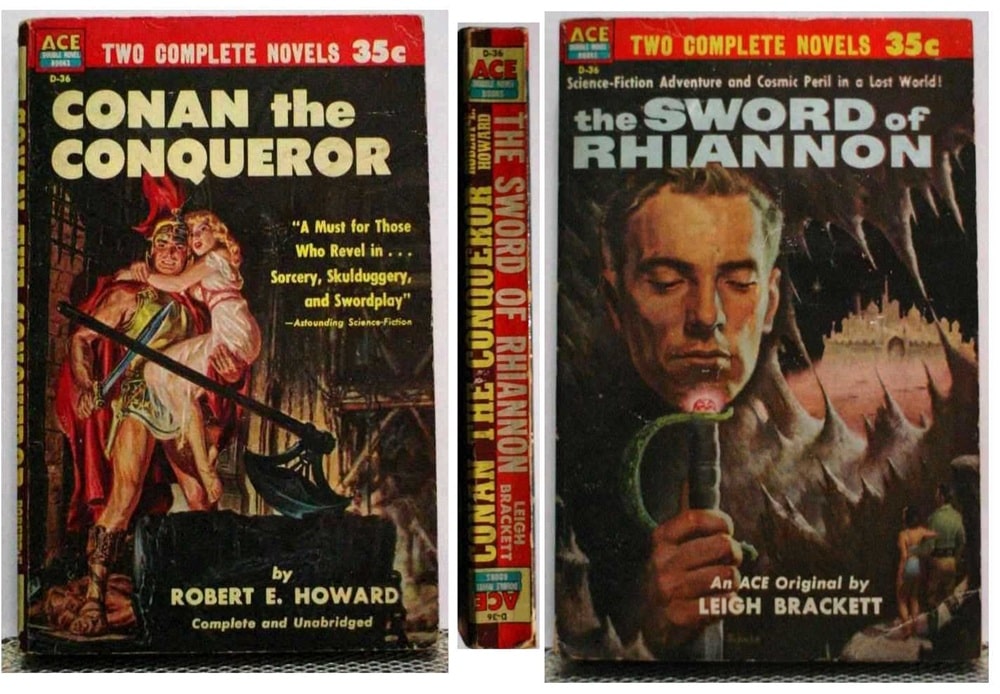
He also published the first Conan paperback.
Yeah.
I understand that was not a success.
I don’t know. I was a kid when he was at Ace.
You not only grew up in this atmosphere but have spent almost your entire life in genre publishing.
Yes, I have. I went to my first convention at age six.
That must give you a different perspective on books.
It does. I do have a different perspective. My boss teased me when I talked about printers in the ‘90s. He got his graduate degree in the ‘90s. I have been working in genre publishing since the ‘70s.
Most people have no idea how books are published.
Most professional writers have no idea how books are published! Some think they can give you a book and have it published two months later. They don’t realize how long it takes.
I think the record… this might be in The Guinness Book of World Records… was a book about landing on the Moon in 1969 that was put together in a weekend. But it has always been my experience that if you rush something into print, you’re going to regret it.
Well something like a book about landing on the Moon…
I am sure they had a lot of that prepared in advance. But if you rush the process, some ghastly mistake is going to get through.
Sure.
I’ve always found that no matter how many times a book has been proofread and copyedited, as soon as you get your first copy of the finished book and you open it up, you will immediately spot a typo. It seems to be a law of the universe.
My father always told me that it is the biggest thing that often gets missed. The first thing, when you’re editing, is that you check the author’s name and the title, and make sure they are spelled correctly. Once at Penguin I was walking past the art department and they had two dust jackets pinned up on a bulletin board. One of them had a picture of Lassie and it was called “JFK Jr.” and the other one had a picture of JFK Jr. and it was called “Lassie.” That’s the kind of mistakes that get made.
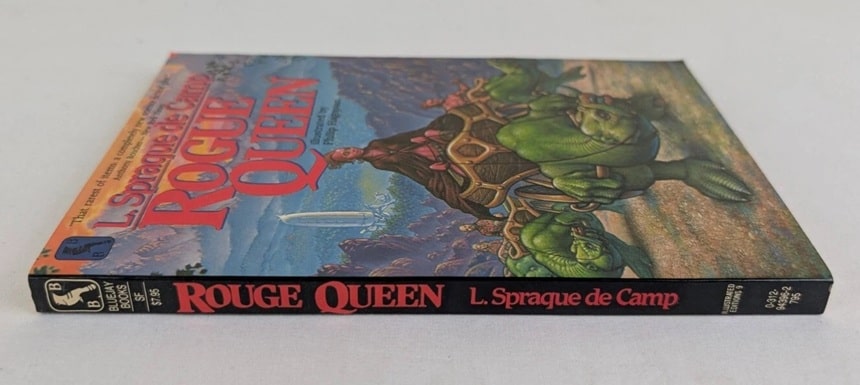
Another one fans still laugh about is the Bluejay edition of de Camp’s Rogue Queen. There are two letters transposed on the spine, so it says Rouge Queen. It went out to stores that way. There was also a time when Isaac Asimov’s Science Fiction Magazine left the words Science Fiction Magazine off the cover. It was so obvious and taken for granted that no one had noticed.
Everybody at DAW reads every single cover three times. It is amazing what can sneak through even though it has been read by five people three times. It’s mind-boggling.
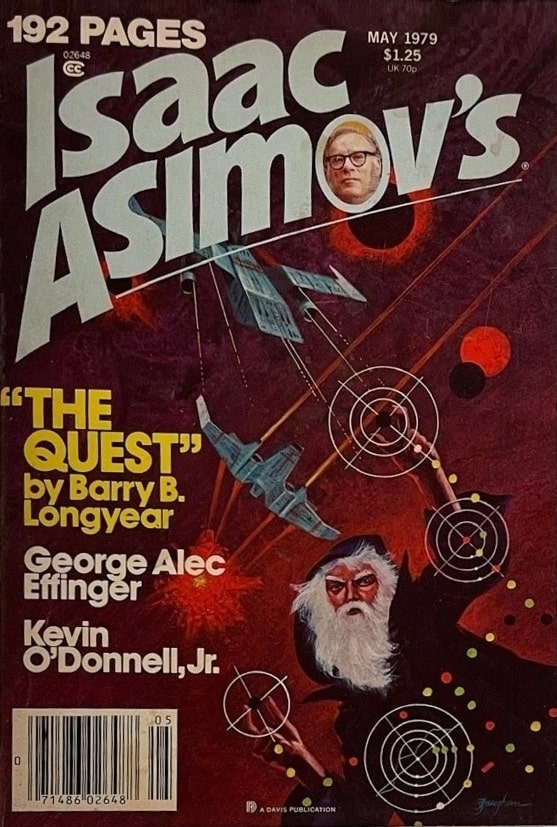
Has the advent of computers made this better or worse?
Oh, God, so much better. I love editing on a computer. It’s so much easier. I can tell the author exactly where I am thinking what, in the margin, and it never gets lost, and the author can’t say they didn’t see it. It’s so much easier.
Actually, I have a horror story in the other direction. In my book The Thomas Ligotti Reader, after it was typeset and carefully proofread and the final file was turned into the publisher, when the book was printed, a chapter was missing.
That does happen. In a TED Talk book from Nnedi Okorafor, two chapters were missing and two chapters were duplicated — but only in a certain number of copies. Unfortunately, I bought one like that. Needless to say, I went back and bought another, correct, copy.
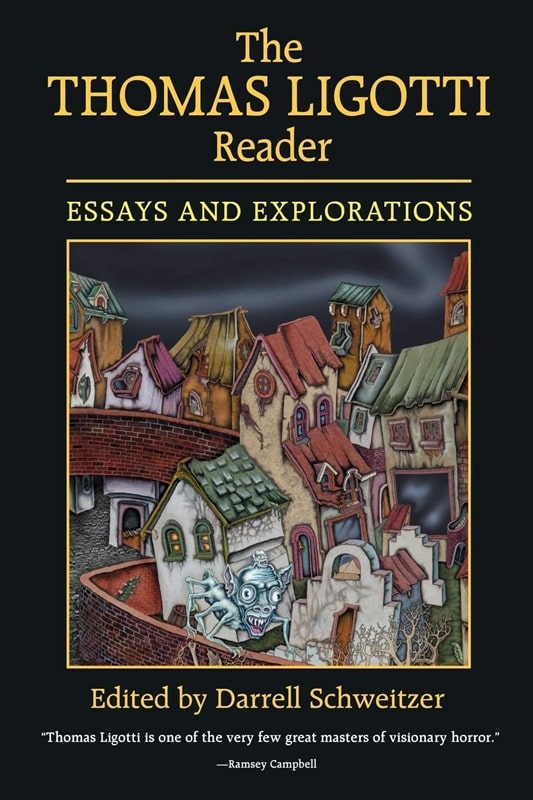 |
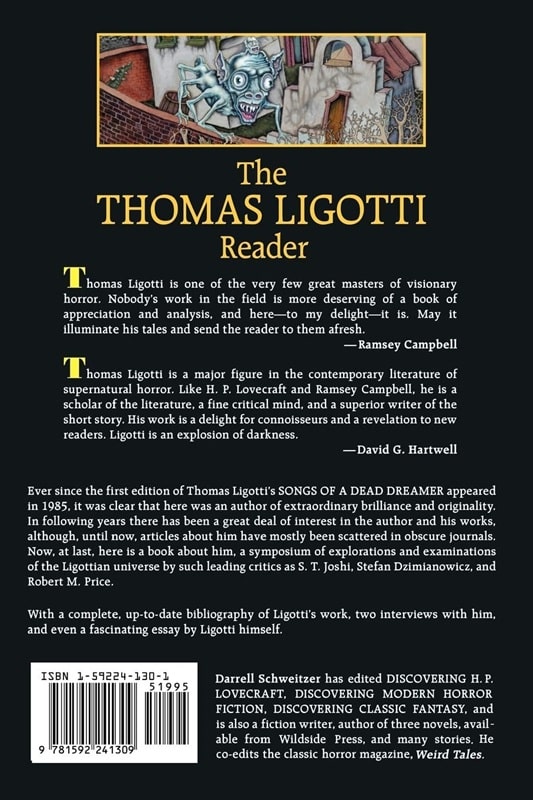 |
The Thomas Ligotti Reader, edited by Darrell Schweitzer
(Wildside Press, April 4, 2003). Cover art by Jason Van Hollander
It was okay in the actual file. There must have been a hidden character somewhere that said “skip this chapter.”
It was a printer’s error. That happens all the time, and publishers don’t really have any control over that. If you get a book that is misprinted somehow, with a chapter missing or duplicated, immediately tell the publisher, because they probably don’t know. It is probably just one day’s printing, not the whole run. Please, inform the publisher. We need to know from the readers that something has gone wrong.
There is another legendary one in our field where Ballantine brought out an edition of de Camp’s Lest Darkness Fall, only a signature of a John Norman book got dropped in the middle.
[Cringes. Covers her face with her hands.] Oh my God …
The typeface is different too. Suddenly the type is a bit larger and you’re no longer reading Sprague de Camp. That one got into the stores.
Printers are not reading while they are printing. So things happen.
What’s the state of science fiction submissions these days? Are you getting a lot of good stuff?
I find that there are more agents than there ever were. If I look through the submissions list, there may be three or four agents that I recognize, and maybe thirty or forty that I have never heard of. In the old days agents were always trained by older agents. Joshua Bilmes, Russ Galen, and Richard Curtis worked for Scott Meredith. Matt Bialer worked for William Morris. They were trained by people who were known in the industry. But now anybody can hang out a shingle and call themselves an agent.
Especially since it is so hard to get a submission read, is it possible that some of these people are just declaring themselves agents, without having any experience? They’re just saying, “Hey, I’m an agent. Read this.”
That’s possible.
So what is the quality of submissions from these agents you have never heard of?
I have such a large list of authors that I primarily work with agents I know. But that’s me. I’m the publisher. My staff works with many agents I have never heard of. Also, I have been working with some new agents myself. For example, I bought two novels by Wole Talabi from the African Literary Agency, and have had a very positive experience. I have to feel there is real quality in a submission before I contact an agent, particularly one I’m not familiar with. But if the material is great, I can work with anyone. I work with so many authors that go back decades. I have been publishing some new people, but not that often. Maybe one or two a year.
 |
 |
Executive Editor Navah Wolfe and Editor Aranya Jain, with DAW Books
Are your assistants also acquiring books?
There are three editors at DAW, myself, Navah Wolfe, and Aranya Jain is our newest editor, and Aranya and Navah are both fantastic.
Is it viable for DAW to do reprints? There’s a lot of great stuff, even dating back to the Ace days, which the world might want to see again.
It really depends on the book. We’ve had some of our books that have been in print since the ‘80s. Armor by John Steakley, has had a lot of different covers. Now it is going into a different format. It’s never stopped selling.
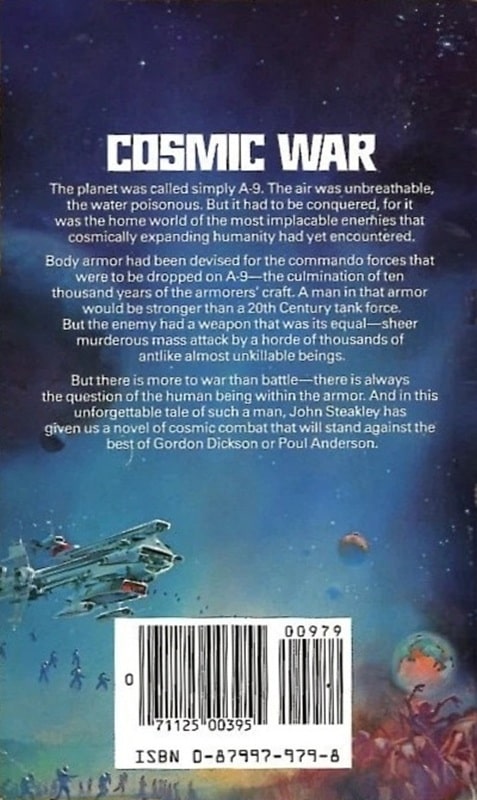 |
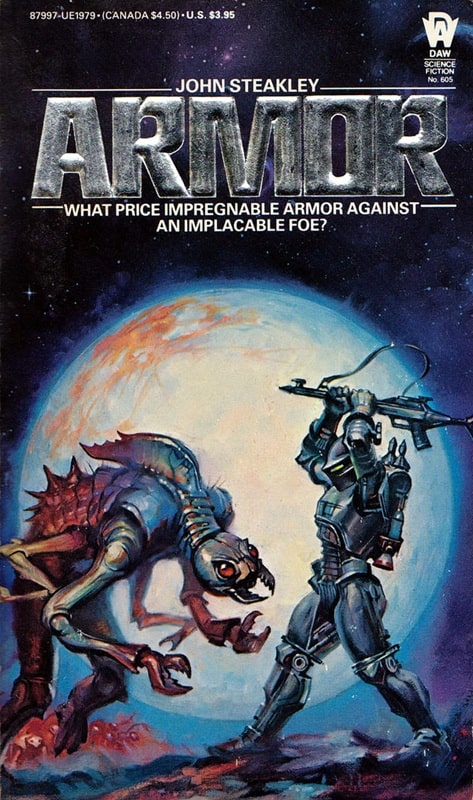 |
Armor by John Steakley (DAW first edition, December 1984). Cover by James Gurney
Suppose you decided to reprint Leigh Brackett today. Would that work?
I don’t think so. I think most people in the industry today are not really interested in the old writers. They are interested in new people with new ideas.
If nobody has read the stuff in a long enough time, doesn’t that make it new all over again?
Not really. Most people are looking for a different kind of voice now, and I am too. For a very long time it’s all been northern European culture that fantasy draws on. That’s mostly white. Now, for the first time, I really see the World Science Fiction Convention being about the world. It’s really amazing and refreshing.
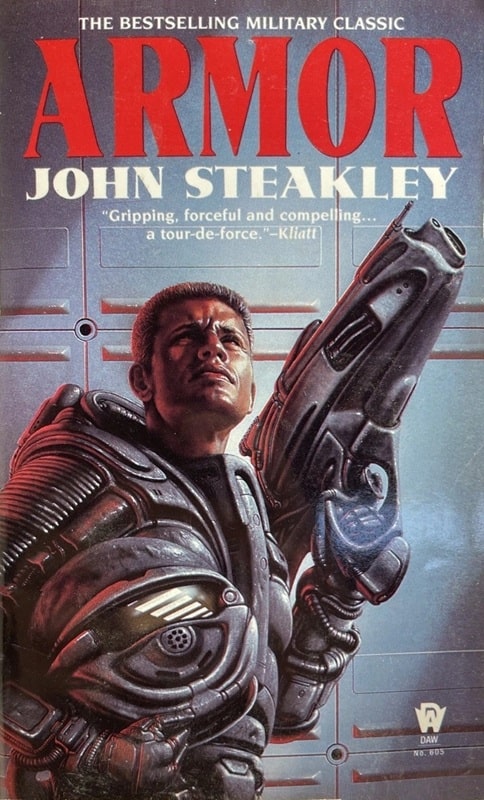 |
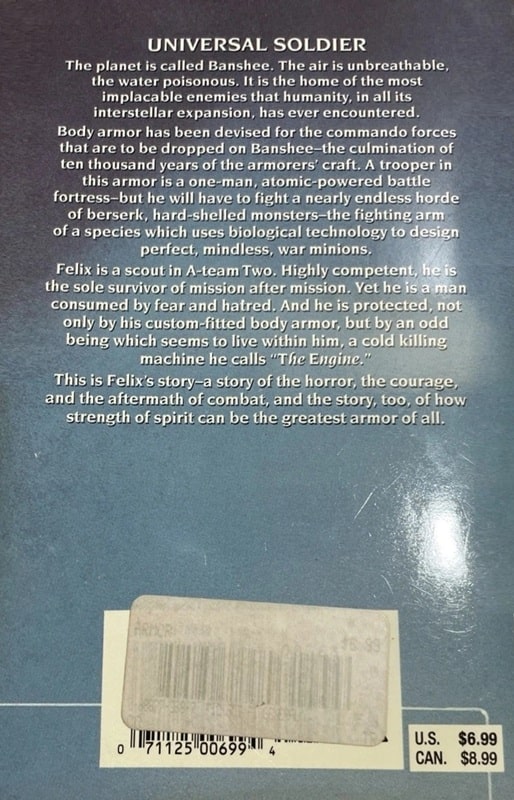 |
Armor by John Steakley (DAW reprint edition, March 1997). Cover by Jim Burns
So, are you publishing any new Chinese authors, for instance?
Yes, the author I found in the slush pile is a Chinese-Canadian woman, Emily Yu-Xuan Qin. She has written an amazing book called Aunt Tigress, which is about an ancient, magical Chinese family who has moved to Calgary, and about how their mythology and magic clashes and merges with native Canadian Black Foot mythology. It sounds heavy, but it’s really a fun read.
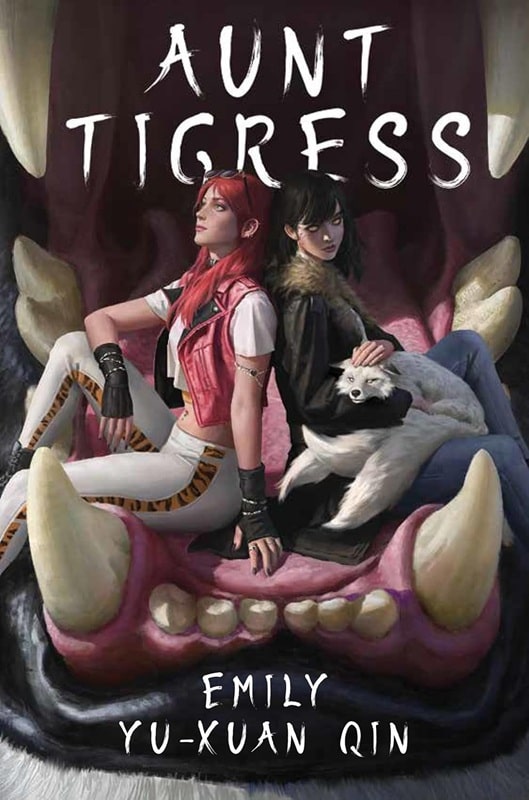 |
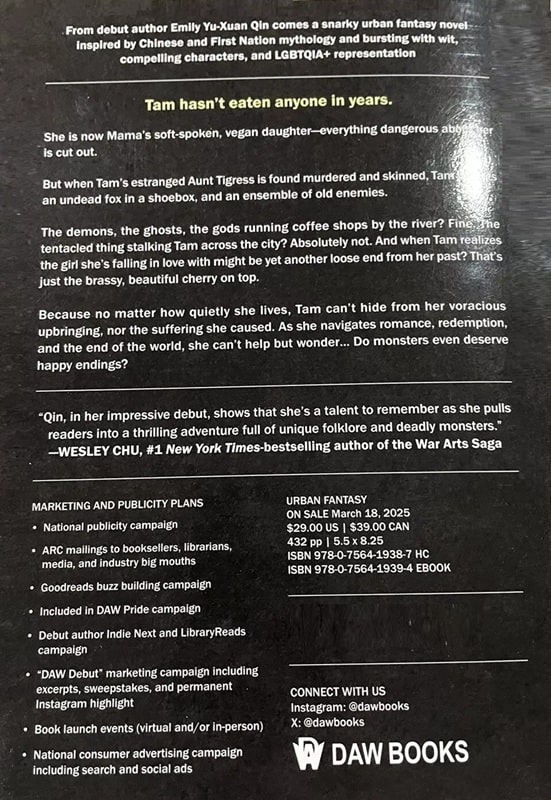 |
Aunt Tigress by Emily Yu-Xuan Qin (DAW Books, March 18, 2025). Cover uncredited
But you are also publishing John Smith from New Jersey.
Yes. Last July I published The Failures by Benjamin Liar, who is from Ohio.
Is DAW doing any horror these days, or is that over?
Yes. I think that what’s happening is that there is a lot of “cosy” happening in our field. Cosy science fiction, cosy fantasy, cosy horror. I find that really interesting, though I tend to leave that to my younger editors.
What exactly is cosy horror?
I am not sure. Horror in general is not really my domain. I am a chickenshit. I don’t read horror. I only read the Stephen King books that I know won’t frighten me like Misery, or The Green Mile. But not every writer is as frightening as Stephen King at his best.
Misery wouldn’t frighten you? An author being imprisoned by a mad fan?
Misery wouldn’t frighten me. I know all about fans and fan craziness.
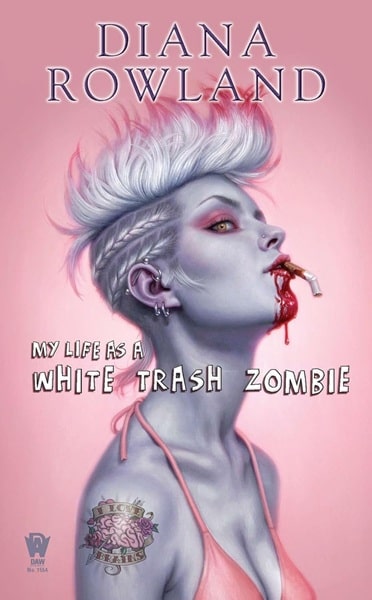 |
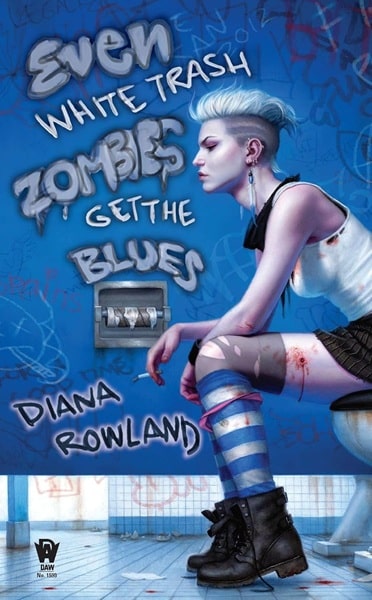 |
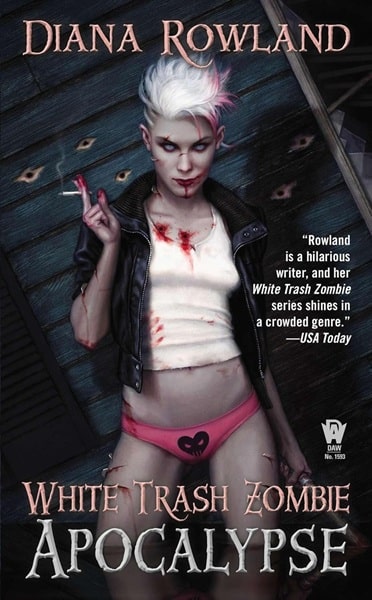 |
The first three novels in Diana Rowland’s White Trash Zombie series from DAW Books:
My Life As a White Trash Zombie (July 2011), Even White Trash Zombies Get the Blues
(July 2012), and White Trash Zombie Apocalypse (July 2013). Covers by Daniel Dos Santos
Cosy horror sounds like zombie romance.
Well I actually published a series with a zombie hero, by Diana Rowland, the White Trash Zombie series. It’s about a poor, junkie girl who has had nothing but trouble and hardship her whole life, and her life is saved by becoming a zombie. She no longer desires drugs, etc. It’s really fabulous. It’s a riot.
Is this humorous?
No. It’s not a humorous series, but Diana has written the only novels I know where the zombie is the hero. The concept in and of itself is somewhat humorous.
I’ve seen vampire heroes and werewolf heroes, but never a zombie hero.
Well, White Trash Zombie has a zombie hero. There are six books in the series.
Okay, I will look for them. But now, something else our audience might want to hear about: What exactly happens between the initial submission and the finished book?
First, you read the book. You like it. You want to publish the book. You speak to the agent and you negotiate with the agent. Often there are other publishers involved, so you have an auction. Sometimes the most money is not chosen, sometimes the author chooses what they feel would be the best editor or the best publishing house. Often editors will talk to the author. That can take quite a while, and once you purchase the book, then you have to figure out where it will fit in the schedule.
The editor has to edit the book. Often the author has to rewrite sections. Then it has to be copy edited, then reviewed by the author, then internally designed and then printed and proofread, often twice, then the staff has to decide on a cover and cover design. It has to be presented to the sales force, it has to be marketed to the booksellers and readers, the book has to be bound etc. etc.
It’s a very labor-intensive process. The book by Benjamin Liar that I published in July that I am very excited about went through five drafts that I saw. And those are only the ones that I saw. It was very hard to understand — I couldn’t originally see the world view, but Ben’s writing was so good that I couldn’t put it down. That is very rare for me, because I have very little tolerance. After over fifty years as an editor, bad writing just doesn’t work for me.
Ben’s writing was so good that even though I didn’t understand the book, I read five hundred pages of the first draft I saw. That doesn’t happen to me. So, I worked with him for years to make the book comprehensible. It is called The Failures and I highly recommend it. It’s brilliant. It’s totally different from anything I’ve ever read. And he’s just a white dude from Ohio, so there you go.
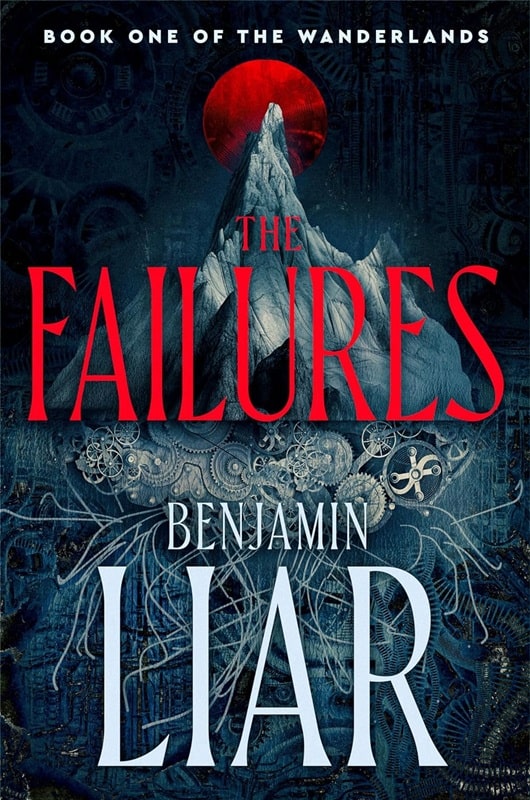
Do you understand the book now?
Yes. He holds his cards very close to his vest. It took a long time to get him to release some of those cards.
Do you ever get a book that requires you to take a leap of faith? You know readers are going to go for this, even if you don’t really understand it, so you have to lean into the dark with it.
I’ve never published a book I didn’t understand. If I don’t understand it, readers won’t understand it, because I have been doing this professionally for over fifty years. So I have to understand it. But I have two different examples of situations that are kind of like that.
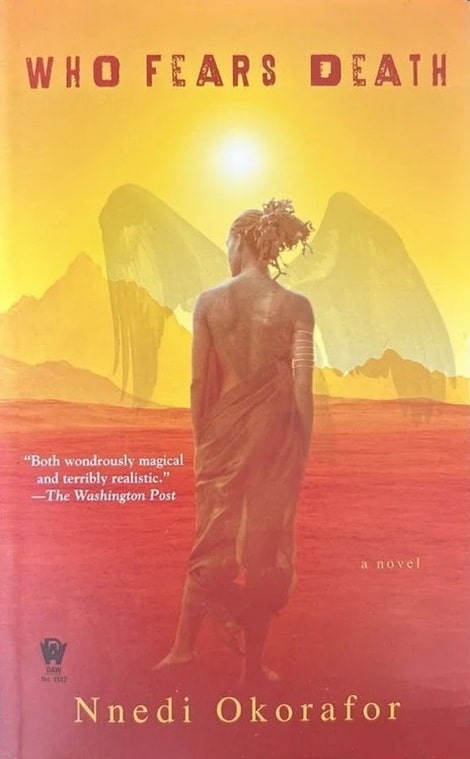 |
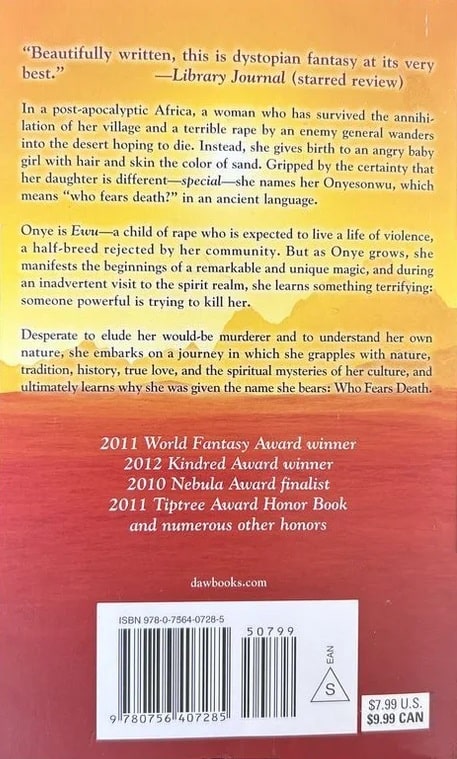 |
Who Fears Death by Nnedi Okorafor (DAW Books paperback reprint, June 2011). Cover uncredited
Who Fears Death by Nnedi Okorafor had been rejected by everyone in the industry before it came to me, I not only loved the book, but felt it was IMPORTANT. I had to publish the author who had that amazing voice! When I presented it to the Penguin sales managers, I was frank: I said “I have no idea if this book will sell, all I know is that it has to be published.” And it won the World Fantasy Award for Best Novel. So I wasn’t leaning into the dark about understanding the book, just whether or not the book would sell. And it did.
A completely different example of this situation is C.S. Friedman. I’ve been working with her for decades, and her best-selling series is Black Sun Rising, When True Night Falls, and Crown of Shadows, which is the Coldfire Trilogy. That sold hundreds of thousands of copies, but at the very end of the third book a lot of readers misinterpreted the ending, even though I felt it was completely clear. That was because I was too close to the author. I understood how she thought. I understood where she was going. I had worked with her for a long time. So a lot of people love the Coldfire Trilogy, but misunderstand the ending of the third book.
That is so frustrating for me. It must be even more frustrating for the author. Though the readers seem fine with the ending because they have their own interpretation, and it works for them.
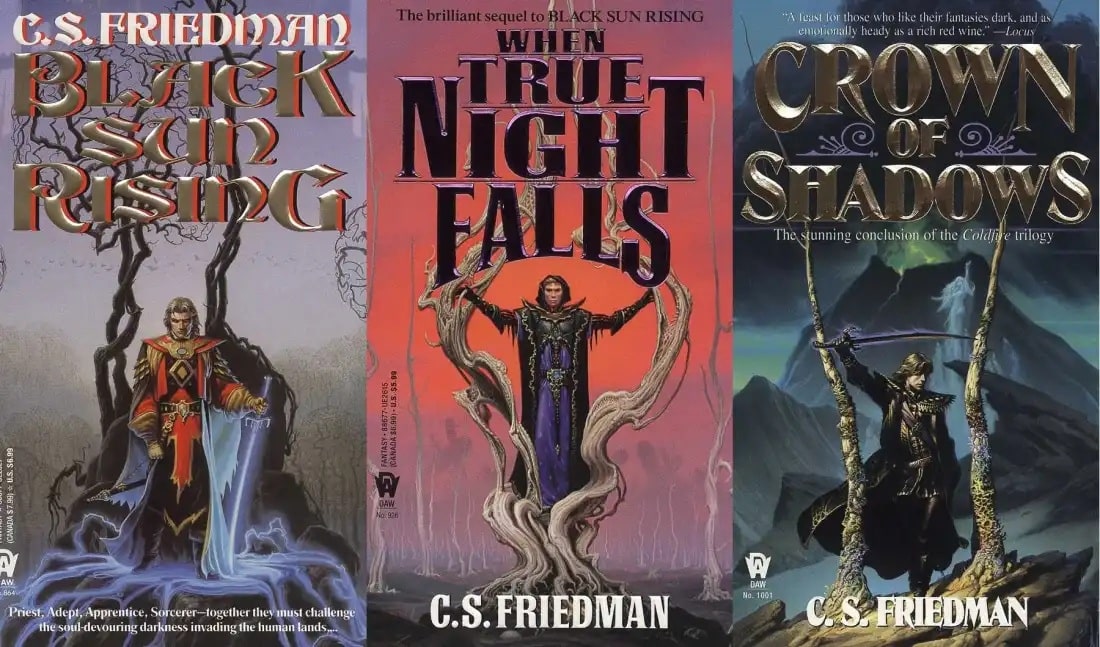
This may be one way that editing novels is different from editing short fiction. A novel is a single object. It has to sell itself. But in a magazine you can get away with anything in ten pages. If you’re not really sure, but you have a hunch about something that is really weird, you can front-load the issue with something you know will be really popular, and if some people didn’t like that one ten-page story, you will get away with it. But if you have a book that people don’t understand, you won’t get away with it.
C.S. Friedman did get away with it, because it is only the very tail end that people didn’t understand. Everything else was completely comprehensible.
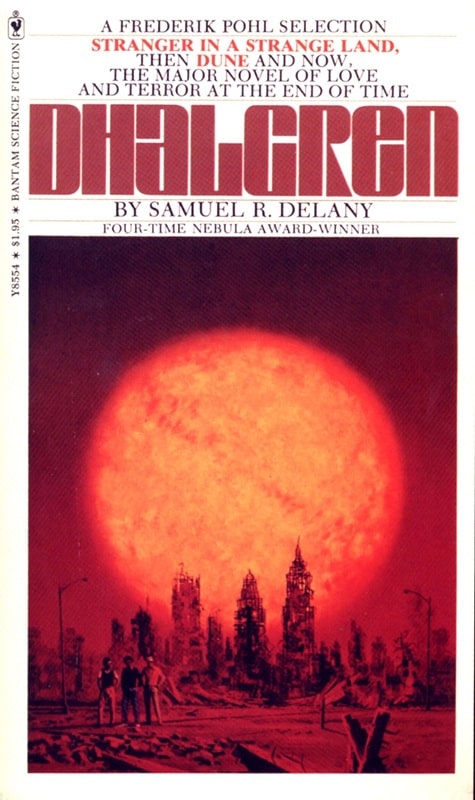 |
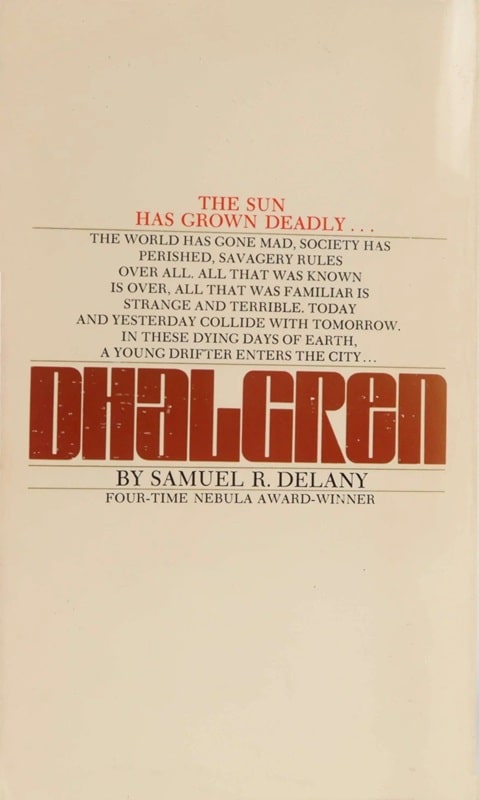 |
Dhalgren by Samuel R. Delany (Bantam Books/A Frederik Pohl Selection, January 1975). Cover by Dean Ellis
I think the greatest editorial leap of faith anybody ever took in our field was when Frederik Pohl published Delany’s Dhalgren. They were calling it “Fred’s folly” at the time. But it is still in print and made incredible amounts of money.
Dhalgren is still a book I have not read and probably will never read. But I almost never read anything that is bound. I have so much editorial work and I am reading so many hours a day that to read for pleasure is almost impossible.
That’s what you get for spending a lifetime in publishing.
Yeah, my father used to call it “Editor’s Syndrome.”
Are you not able to read things that are completely apart from what you publish?
Occasionally. I read Nnedi Okorafor’s TED Talk book, which is brilliant.
Continued in Part II.
Darrell’s last article for Black Gate was See The Northman If You Can.
Hmm. This explains a few things.
Also, seeing the ’97 Steakly “Armor” with the Burns cover, here, was rather electrifying. That one’s on my shelves at the precise place I see most often.
She did not “cancel” John Norman. She decided that she, as a publisher, no longer wished to publish his books, which he was then free to take to any other publishing house that would have him.
That was great! I’m really looking forward to part two.
I own many of the books whose covers are in that second picture, behind the four of them, and recognize even more of them.
Epic and fascinating interview, and a Part 2 is promised! Thanks for sharing this
Thanks for the great interview. I’ve always been fascinated by the whole publishing industry, both magazine and book, particulary during the golden age of slush piles and editors who trusted their guts with a manuscript simply because it was good and deserved to see the light of day, sales potential be damned. The bits about how frequently printing mistakes slip through depite the best, dedicated efforts of everyone involved, illuminates just how hard the job really is.
This also confirms some of my worst fears about how social media and print-on-demand are transforming publishing for the worse and where the next generation of promising writers will come from. If that sounds cynical go eavesdrop on the customer conversations around the fantasy and romance sections of your local bookstore and then look at the ever shrinking selections offered by all but the most committed independent book shops.
On the other hand, it’s encouraging to read how open minded, even excited, Wollheim is about the new generation of writers and the fast evolution of the genres. I personally don’t have any curiosity about much of what’s being published in the fields these days but that’s OK, I had my reader’s day in the sun and I have no problem in letting new generations develop their own appetites although some of the subgenre marketing feels a bit forced these days, particularly the cozy nonsense. Looking forward to the next installment.
That’s an interesting discussion. I’m the author of 4.5 published books (four by me alone, one co-authored, all professionally published by small presses), and I’ve experienced much of what is described. My last two books are mostly free of typos, but that is because I personally proof-read them, and sent the typesetting back for corrections three times in each case.
Times were different in 1985. It’s nice to see all the Ken Kelly artwork, but we know in hindsight that John Norman and Ken “Alan Burt Akers” Bulmer would soon no longer be part of the picture. Norman is still going, Book #39 of the Gor series is supposedly being edited now. I’m still a fan, as I indicated in the recent Gor post on this site.
Here’s a bit of trivia. Sheila Gilbert was (maybe still is?) the wife of Mike Gilbert. He was an illustrator in various Fantasy-related products in the early 80s. He provided much of the artwork for the 1983 Second Edition of the Chivalry & Sorcery Roleplaying Game. I also saw his work in a Game-book by the late Rhondi A. Vilott Salsitz, who was also known by several pen names (such as Charles Ingrid) when she wrote for DAW and Sheila Gilbert. Was there a connection? Rhondi probably knew Mike, through Sheila.
Yellow spines, forever!
[…] BETSY WOLLHEIM Q&A. Darrell Schweitzer conducts “Daughter of DAW: An Interview with Publisher Betsy Wollheim, Part I” at Black Gate. Schweitzer’s questions are boldfaced, followed by Wollheim’s […]